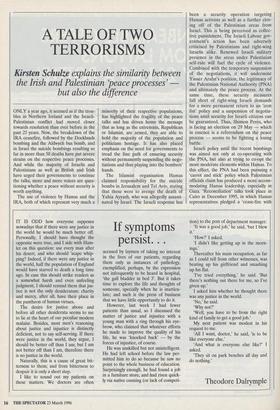If symptoms
persist.. .
IT IS ODD how everyone supposes nowadays that if there were any justice in the world he would be much better off. Personally, I should have thought the opposite were true, and I side with Ham- let on this question: use every man after his desert, and who should 'scape whip- ping? Indeed, if there were any justice in the world, half the population of England would have starved to death a long time ago. In case this should strike readers as a somewhat harsh and even unfeeling judgment, I should remind them that jus- tice is not the only desideratum: charity and mercy, after all, have their place in the pantheon of human virtues.
The desire for justice above and before all other desiderata seems to me to lie at the heart of our peculiar modern malaise. Besides, most men's reasoning about justice and injustice is distinctly deficient, not to say self-serving. If there were justice in the world, they argue, I should be better off than I am; but I am not better off than I am, therefore there is no justice in the world.
Naturally, this is a cause of great bit- terness to them; and from bitterness to despair it is only a short step.
I like to sound out my patients on these matters. We doctors are often accused by laymen of taking no interest in the lives of our patients, regarding them only as instances of pathology, exemplified, perhaps, by the expression not infrequently to be heard in hospital, `the gall bladder in bed 3'. But it takes time to explore the life and thoughts of someone, specially when he is inarticu- late; and such is the press of business that we have little opportunity to do it.
However, last week I had fewer patients than usual, so I discussed the matter of justice and injustice with a young man with a ring through his eye- brow, who claimed that whatever efforts he made to improve the quality of his life, he was 'knocked back' — by the forces of injustice, of course.
He was unskilled but not unintelligent. He had left school before the law per- mitted him to do so because he saw no point to the whole business of education. Surprisingly enough, he had found a job in a furniture store, and had risen quick- ly via native cunning (or lack of competi- tion) to the post of department manager. `It was a good job,' he said, 'but I blew it.'
`How?' I asked.
`I didn't like getting up in the morn- ings.'
Thereafter his main occupation, as far as I could tell from other witnesses, was beating up his girlfriend and smashing up his flat.
`I've tried everything,' he said. 'But there's nothing out there for me, so I've given up.'
I asked him whether he thought there was any justice in the world.
`No,' he said.
`Why not?'
`Well, you have to be from the right kind of family to get a good job.'
My next patient was modest in his request to me.
`All I want, doctor,' he said, 'is to be like everyone else.'
`And what is everyone else like?' I asked.
`They sit on park benches all day and do nothing.'
Theodore Dalrymple


































































 Previous page
Previous page